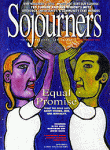"We know that some of you, called by the Pentagon, have opted instead for the Pentateuch." It was a sobering greeting for my incoming class at the Lutheran Seminary at Philadelphia. I was the oddball, straight from a conversion experience during an anti-racism seminar held in the "occupied" Washington, D.C., of 1968. The doyens of Confessionalism welcomed me to privileged 4-D status, higher biblical criticism, and a "professional school" atmosphere more likely to foster debates about clergy salaries than about the connections between institutionalized racism and the war.
By internship time I had serious doubts about God, the institutional church, and my place in it. Pastor Bob Neumeier, founding director of the Center City Lutheran Parish, listened to my story, invited me down to his Center City office, and introduced me to Jim Littrell, a young, bearded Episcopal priest in clerical collar and lumberjack shirt who had received a call from the Diocese of Pennsylvania to start a street ministry. I was granted an internship in the Episcopal Church of anti-war activist Father David Gracie and Bishop Bob Dewitt. While most of the Lutherans I knew were busy debating "situation ethics" in classrooms and pulpits, the Episcopalians I knew were burning draft cards on JFK plaza and building working relationships with activists like Sister Falakah Fatah and the House of Umoja.
Littrell helped me see the biblical narrative on the street. Neumeier taught me how congregations "embody" their ethnically and economically marginalized neighborhoods. DeWitt and Lutheran Bishop Harold Janson showed me that venerated church leaders could "lift high the cross" in the face of monied resistance. Building community with street people taught us middle-class idealists and radical wannabes that our pretensions needed to be crucified alongside the hopelessness of our would-be "clients."
Our office and drop-in center next to the diocesan church house was torched, staff were punched out by feisty guests, a young female colleague was dragged down a flight of stairs by "peace" officers. Lots of battles, few victories. Then we got smart, narrowed our focus to housing, counseling, and referral—and the center, Voyage House, is still going strong, almost 30 years later.
Somewhere that year Jesus converted me again. It wasn’t the de-mythologized remnant left for faith at the end of the "historical quest," nor the pale, Prell-shampooed Sunday school Jesus, but Jesus the friend of poor people and hustlers, Jesus whose hand held mine as I walked Frank up and down all night until he came down from a bad trip, Jesus who fed us when we gathered in the basement of Trinity Episcopal Church for Thursday night soup and sacrament. It wasn’t an Episcopal Jesus or a Lutheran Jesus, but a human Jesus able to illuminate the image of God in every face.
THAT EPISCOPAL CO-WORKER who bounced down stairs joined me in marriage in 1972; Lutheran-Episcopal dialogue has continued. We reached "full communion" a little early. It happened at our wedding service, when Lutheran seminary professors and Episcopal rectors and canons passed the peace and shared the cup (and danced a step or two!) with street hoodlums, homeless folk, black militants, mainline executives, Midwestern farmers, and us newlyweds. All the labels dropped off and we were just God’s folk, together.
Back in street ministry, I now work at Luther Place Church in Washington, D.C.—where Rev. Betsy Hague, an Episcopal priest, came on staff to direct the women’s program and share sacramental duties when I did. When we concelebrate the Eucharist, wash feet side by side, or lay hands on crack-recovering ex-prostitutes and credit-addicted suburbanites, it seems blasphemous to suppose God cares whose hands she is using. So, as always, God is at work, calling through the people at the margins—who may yet move our institutions into a full complementarity expressive of the gospel.
The cultural sacrament of Norwegian-Americans is "lutefisk," a preparation of codfish pickled in lye which, we believe, only Norskies can enjoy (some of us may be faking). My aunt Charlotte coined the term "lut-episc" to describe what happened when a descendant of codfishermen on the Lofoten Banks united bone and flesh with a great-granddaughter of early Philadelphia tradesmen and bankers. It’s exotic, but it works.
Less exotic but even more workable, from our standpoint, is the notion of full communion between our two faith traditions. We grieved, briefly, when we heard the results from the Evangelical Lutheran Church in America (ELCA) churchwide assembly last August (which came six votes short of approving closer relations with the Episcopal Church)—just as we celebrated, moderately, when we heard the results of the Episcopal vote in July approving the agreement.
We did neither very long, because we’re too busy practicing what Thomas Merton preached: "My dear brothers (and sisters), we are, already, one. But we imagine that we are not. And what we have to recover is our original unity. What we have to be is what we are."
BOB HOLUM is director of the Lutheran Volunteer Corps and a pastor at Luther Place Church in Washington, D.C.

Got something to say about what you're reading? We value your feedback!